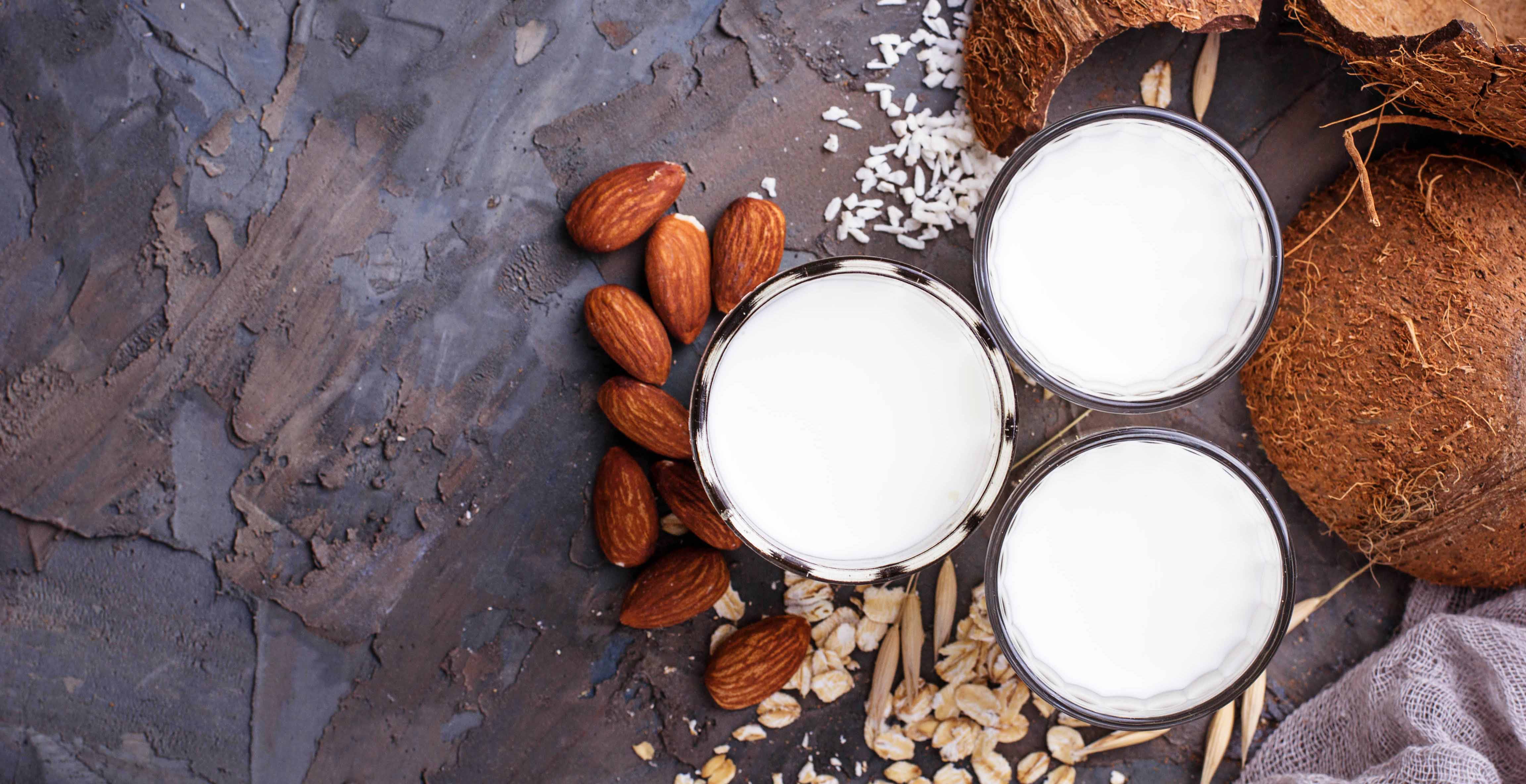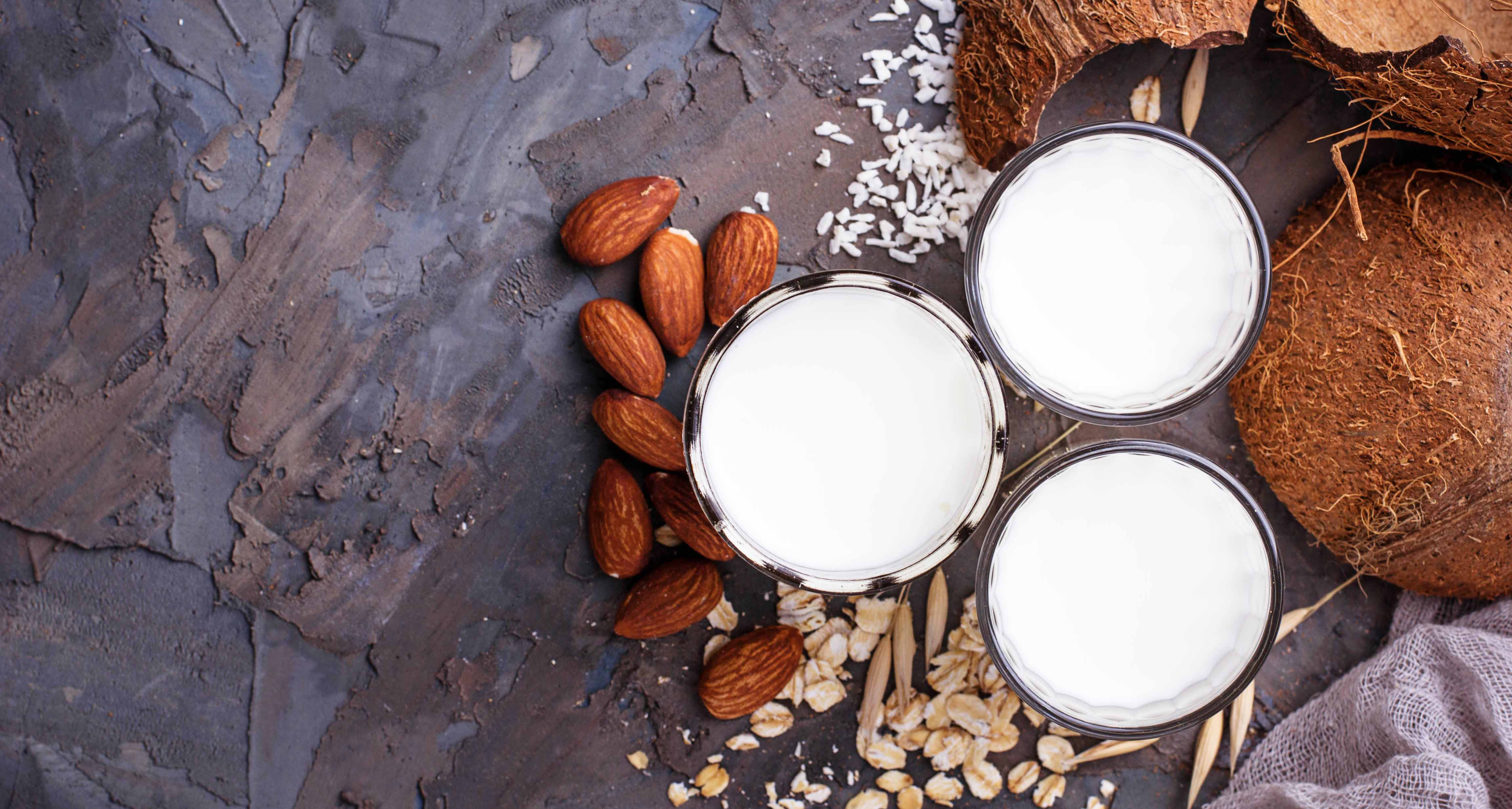

If you’re looking for a non-dairy alternative to traditional cow’s milk, here are some “mylk” options to consider.
“As more shoppers choose a dairy-free diet, alternatives for cow’s milk [are] overflowing with nut, pea, and grain-based choices,” says registered dietitian Julie Upton, co-founder of Appetite for Health.
Upton shared some insight into how different “mylks” compare.
Almond Milk
“Almond milk is a diet ally because it’s low in calories,” Upton says. “Use it as a one-for-one [dairy] substitution when cooking or baking. In some recipes, you’ll detect a nuttier taste and texture. Choose unsweetened varieties for savoury dishes.”
Nutrition profile, according to Upton:
One Cup Serving (original flavour): 60 calories, 2.5 grams fat, 0 grams saturated fat, 1 gram protein, 0-7 grams sugar, 45% DV calcium, 25% DV vitamin D. Almond milk also offers riboflavin, vitamin B12 and zinc. Because almonds are rich in vitamin E, almond milk is the only milk known to be an excellent source of the nutrient.
Coconut Milk
“Coconut milk works well in recipes that require a creamy, rich consistency like sauces, gravies or puddings as a direct replacer for cow’s milk. It provides a rich, creamy taste similar to half-and-half, so most enjoy it in coffee,” says Upton.
Nutrition profile, according to Upton:
One Cup Serving (original flavour): 80-100 calories, 5 grams fat, 5 grams saturated fat, 1 gram protein, 6-10 grams sugar, 45% DV calcium, 25% DV vitamin D, 50% vitamin B12. A glass of coconut milk packs in a quarter of your daily saturated fat, which health organizations advise to limit to help protect against heart disease and certain types of cancer.
Hemp Milk
“Hemp milk provides a small amount of omega-3 fatty acids, but it lacks the protein of cow’s milk and has added sugars. You’ll need to experiment with it when cooking and baking because its sweetness may impact the flavour of savoury items,” Upton explains.
Nutrition profile, according to Upton:
One Cup Serving (original): 70-100 calories, 5-6 grams fat, 0.5 grams saturated fat, 2-4 grams of protein, 6 grams sugar, 30-50% DV calcium, 25% vitamin D,25% DV riboflavin, 25% vitamin B12. Hemp milk also provides phosphorus and magnesium.
Macadamia Milk
“This higher-fat nut is now available as a dairy-free milk and it is richer and creamier than most other nut milks because most of its calories come from fat,” Upton explains. “If you want protein, don’t count on macadamia nut milk because it has none.”
Macadamia nut milk is, however, higher in calcium and vitamin E compared with other dairy-free choices, she says.
Nutrition profile, according to Upton:
One Cup Serving (original flavour): 60 calories, 3.5 grams fat, .5 grams saturated fat, 0 grams protein, 7 grams sugar, 50% DV calcium and vitamin E, 25% DV vitamin D.
Pea Milk
“Pea milk is one of the newest dairy-free alternatives and it has a taste and texture very similar to cow’s milk,” says Upton. “It packs in more calcium and vitamin D from fortification. Made from yellow split peas, pea milk has the same protein as cow’s milk and it is also available in an unsweetened version with no added sugar.”
Nutrition profile, according to Upton:
One Cup Serving (Original): 100 calories, 5 grams fat, .5 grams saturated fat, 8 grams protein, 6 grams sugar, 45% calcium, 30% vitamin D, good source of iron and vitamin A.
Rice Milk
“Because rice milk is both dairy-free and nut-free, it’s a great option for anyone with those specific allergies,” says Upton. In fact, that’s usually why it’s recommended – but not so much for its nutritional profile, she explains.
“At 120 calories per cup, rice milk is one of the highest-calorie plant-based milks, but also is low in protein and higher in sugars. … It works well for sweets as well as in soups or thin sauces but lacks the fat necessary to make anything creamy.”
Nutrition profile, according to Upton:
One Cup Serving (original): 110-120 calories, 2 grams fat, 0 grams saturated fat, 1 gram of protein, 12-14 grams sugar, 30% DV calcium, 25% vitamin D, 25%DV vitamin B12.
Soy Milk
“Soy milk also offers vitamin A, iron, riboflavin, folate, vitamin B12, potassium and magnesium,” Upton says. “Soy provides beneficial phytoestrogens that provide heart health benefits, too.”
She adds that soy milk can be used in cooking as a one-for-one dairy milk substitution. “It works for many dishes and baking, but soy milk may separate when exposed to high heat or acidic foods like citrus, vinegar or tomatoes. Look for unsweetened varieties for savoury dishes.”
For comparison, Upton shared a nutrition profile of cow’s milk:
One Cup Serving (Skim): 80 calories, 0 grams fat, 0 grams saturated fat, 8 grams of protein, 30% DV Calcium and 25% of the Daily Value for Vitamin D. Dairy milk also offers potassium, phosphorus, vitamins A and B vitamins.
“Cow’s milk is loaded with nutrients and it’s also a natural good source of quality whey protein,” Upton says. “It also has no added sugars, unlike many plant-based milks.”
Nutrition profile, according to Upton:
One Cup Serving (original flavour): 100 calories, 4 grams fat, 0.5 grams saturated fat, 6 grams protein, 2-8 grams sugar, 30% DV calcium and 30% DV vitamin D.
